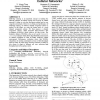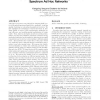1193 search results - page 224 / 239 » The Capacity of Heterogeneous Wireless Networks |
ISCC
2002
IEEE
14 years 17 days ago
2002
IEEE
–– The last few years have seen the evolution of telecommunications from the classic architectures, mainly based on static and wired structures, to the new mobile solutions bas...
MOBIHOC
2008
ACM
14 years 7 months ago
2008
ACM
Mobile opportunistic networks are characterized by unpredictable mobility, heterogeneity of contact rates and lack of global information. Successful delivery of messages at low co...
IWCMC
2006
ACM
14 years 1 months ago
2006
ACM
Multi-hop relaying is an important concept in tackling the inherent problems of limited capacity and coverage in cellular networks. It helps to solve the dead-spots problem and to...
MOBIHOC
2005
ACM
14 years 7 months ago
2005
ACM
This paper proposes a new principle for designing MAC protocols for spread spectrum based ad hoc networks ? inducing spatial clustering in contending transmitters/receivers. We fi...
SECON
2008
IEEE
14 years 2 months ago
2008
IEEE
—Delay Tolerant Networks are wireless networks where disconnections may occur frequently due to propagation phenomena, node mobility, and power outages. Propagation delays may al...



